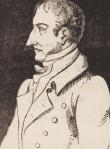Issac (Ikey) Solomons was born about 1787 to a Jewish family of nine children. The family lived in Gravel Lane, Houndsditch, in the East End of London. In his late teens or early twenties, Ikey married a Jewish woman by the name of Ann (or Anna or Hannah) Julian on 7 January, 1807. Ikey and Ann would have six children together.
Opening a pawn shop, Ikey reputedly began to follow in his father’s footsteps as a fence. He later opened another pawn shop in Bell Lane which became a major front for receiving stolen goods in London. During this period, Ikey would gain a reputation as a prominent figure in the criminal underworld.
In 1810, Ikey and an associate were arrested for pickpocketing. Both men were tried at the Old Bailey in June that same year and found guilty of stealing. Ikey was sentenced to transportation for life, yet remained in England on the prison hulk Zetland. He was apparently released by mistake, due to a bureaucratic error, in 1816.
Ikey returned to London and resumed his career as a pawnbroker and fence. His criminal activities were highly successful until he was again arrested on 25 April, 1827, on suspicion of theft and receiving stolen goods. Ikey’s friends and family soon orchestrated and carried out a plan to spring him from custody. A substantial reward was offered for his capture yet Ikey still managed to elude the authorities with reports that he had escaped to America.
Ann Solomons was convicted as a partner in Ikey’s criminal activities and sentenced to penal transportation to Tasmania. Once Ikey learnt of this, he made arrangements to join her in Tasmania, arriving in Hobart on 6 October, 1828. Upon arrival, he set up a general store in Elizabeth Street.
The Tasmanian authorities were unable to find a legal precedent to arrest Ikey under Tasmanian laws, but petitioned the Home Office for an arrest warrant, which did not arrive until late 1829. His arrest was secured on 6 November, 1829, and preparations were begun to extradite him back to Britain. In November that same year, Ikey boarded the Prince Regent for England.
Arriving back in England in 1830, Ikey stood trial at Old Bailey, and was convicted on two of the eight charges laid against him: one count of receiving and one count of simple larceny. The judge sentenced him to fourteen years of transportation, and Ikey was returned to Hobart in November, 183,1 an housed in Richmond Gaol. In 1835, Ikey was granted a ticket-of-leave which enables him to return to his family and take up work in the district.
Ikey’s reunion with his family was far from ideal, however and he and Ann eventually decided to live apart. In 1838, Ikey left his family and moved to New Town. Both he and his wife were granted conditional pardons in 1840, with Ikey receiving a certificate of freedom four years later.
In the twilight period of his life, Ikey lived out a quiet existence in Hobart where he ran a tobacconist shop. He eventualy died on September 3, 1850, and was buried the next day in Hobart’s Jewish cemetery.
See full Austlit entry.
 4839556303076747115.jpg
4839556303076747115.jpg
 4839556303076747115.jpg
4839556303076747115.jpg